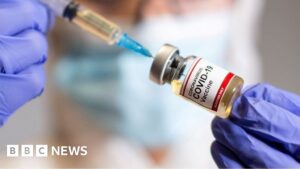Organogenesis Reports Positive Interim Analysis of Second Phase 3 Clinical Trial of ReNu for Knee Osteoarthritis


CANTON, Mass., Nov. 11, 2024 (GLOBE NEWSWIRE) — Organogenesis Holdings Inc. (Nasdaq: NASDAQ:), a leading regenerative medicine company focused on the development, manufacture, and commercialization of product solutions for the Advanced Wound Care and Surgical and Sports Medicine markets, today announced the favorable outcome of the interim analysis of its second Phase 3 randomized control trial of ReNu, a cryopreserved amniotic suspension allograft (ASA), for the management of symptoms associated with knee osteoarthritis (OA).
The pre-specified interim analysis on 50% of the planned 474 patients with moderate to severe knee OA (Kellgren-Lawrence [KL] severity grade 2 to grade 4) focused on the 6-month primary endpoint for potential sample size re-estimation. The independent Data Monitoring Committee (DMC) for the trial provided directional guidance on the results of the interim analysis, while rigorously maintaining all aspects of study blinding. The DMC recommended that the trial proceed without modification and without increase to sample size. Additionally, the DMC found the safety data to be consistent with the known safety profile for ReNu.
We have passed another critical milestone in the ReNu development program, said Patrick Bilbo, Chief Operating Officer of Organogenesis. We are pleased with the outcome of the interim analysis which indicates the study is in the favorable zone and consistent with the assumptions for the statistical plan and efficacy expectations.
The fully enrolled 594 patient Phase 3 trial is a prospective, double-blind, multicenter, saline-controlled, parallel group, randomized control trial (RCT) of ReNu ASA, for the treatment of subjects with moderate to severe symptomatic knee OA. Patients were randomized to receive a single intra-articular (IA) injection of either saline control or ReNu. The primary endpoint is the reduction in knee pain assessed by the Western Ontario and McMaster Universities Arthritis Index (WOMAC) pain scale performed on subjects treated with ReNu or saline.
We are pleased with the progression of this second Phase 3 clinical trial, said Adam B. Yanke, MD, PhD, Associate Professor of Orthopedics and Vice Chair of Research at Rush University Medical (TASE:) Center, and Co-Principal Investigator of the trial. Based on our progress to date, we are encouraged that the results of this study, when complete, will further strengthen the clinical evidence supporting ReNu as a safe and effective non-surgical treatment option for patients suffering from knee OA pain.
Knee OA is a degenerative joint disease that is estimated to affect nearly 31.1 million Americans and projected to grow to 34.4 million Americans by 2027. It is ranked among the most common causes of disability and poor quality of life, generally characterized by pain and functionality deficits. End stage management of the disease in these patients is typically a total knee replacement when all other treatment options are exhausted.
About Organogenesis Holdings Inc.
Organogenesis Holdings Inc. is a leading regenerative medicine company focused on the development, manufacture, and commercialization of solutions for the advanced wound care and surgical and sports medicine markets. Organogenesis offers a comprehensive portfolio of innovative regenerative products to address patient needs across the continuum of care.
Forward-Looking Statements
This release contains forward-looking statements within the meaning of the Private Securities Litigation Reform Act of 1995. These forward-looking statements relate to expectations or forecasts of future events. Forward-looking statements may be identified by the use of words such as forecast, intend, seek, target, anticipate, believe, expect, estimate, plan, outlook, and project and other similar expressions that predict or indicate future events or trends or that are not statements of historical matters. These statements concern, and these risks and uncertainties include, among others: the risks and uncertainties inherent in clinical development; that interim results are not necessarily indicative of final results; that other clinical trials of ReNu may produce different results; the likelihood and timing of possible regulatory approval and commercial launch of ReNu; determinations by regulatory and administrative governmental authorities which may delay or restrict our ability to develop or commercialize ReNu; ongoing regulatory obligations and oversight impacting ReNu; unforeseen safety issues resulting from the administration of ReNu in patients; competing products and product candidates that may be superior to our products and product candidates; uncertainty of market acceptance and commercial success of ReNu and the impact of studies (whether conducted by us or others and whether mandated or voluntary) on the commercial success of ReNu; our ability to manufacture and manage supply components for ReNu; the availability and extent of reimbursement of ReNu from third-party payers, including private payer healthcare and insurance programs and government programs such as Medicare and Medicaid; coverage and reimbursement determinations by such payers, including local coverage determinations by Medicare Part A/B Medicare Administrative Contractors; new policies and procedures adopted by such payers; unanticipated expenses; the costs of developing, producing, and selling ReNu; our ability to meet our sales or other financial projections or guidance and changes to the assumptions underlying those projections or guidance; and other risks and uncertainties described in the Company’s filings with the Securities and Exchange Commission, including Item 1A (Risk Factors) of the Company’s Form 10-K for the year ended December 31, 2023 and its subsequently filed periodic reports. You are cautioned not to place undue reliance upon any forward-looking statements, which speak only as of the date made. Although it may voluntarily do so from time to time, the Company undertakes no commitment to update or revise the forward-looking statements, whether as a result of new information, future events or otherwise, except as required by applicable securities laws.





